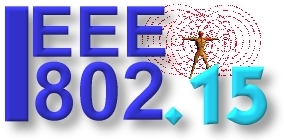|
|
IEEE 802.15 WPAN™
Terahertz Interest Group (IGthz)
|
||||||||||||||
|
|
|
||||||||||||||
|
Overview The IEEE 802.15 Standing
Committee Terahertz is chartered to explore the feasibility of
Terahertz for wireless communications. The Terahertz frequency band runs
roughly from 300 GHz to 3 THz, a staggering 2700 GHz of bandwidth. The
Terahertz frequency range has traditionally been considered the RF "no
man's land", being too high to be considered RF but too low to be
considered light. But with on-going advances in semiconductor processes
we are seeing the emergence of transistors with Ft high enough to start
servicing the low end of the THz band (300 GHz to 600 GHz). This is
still an impressive 300 GHz of bandwidth providing a vision of wireless data
rates of 100 Gbit/s and beyond. Numerous
research groups all over the world have initiated research activities in this
emerging field. In 2017 IEEE std. 802 has published IEEE 802.15.3d-2017 as
the first wireless standard for 300 GHz for fixed point-point links. Apart from the implementation aspects of THz
Communications there are important regulatory aspects to be considered. For
example the allocation of THz spectrum for passive services, amongst others,
are topics of the THz standing committee. Current Status The IEEE 802.15 Standing Committee
Terahertz is soliciting, and hearing, contributions that
address numerous THz issues. There are no immediate plans to transition
the group to a study group or a task group; rather, we want to fully
understand the technology status in regards to a further amendment of IEEE Stdf. 820.15.3 or a completely new standard. How to participate
Information A good overview about the state-of-the-art in THz
communications is provided in the
archive of documents presented in
IEEE 802.15 SC THz. Who to contact with
questions
The Institute
of Electrical and Electronics Engineers, Inc. |
|
|
|
|
If you would like to contact the
IEEE 802.15 Webmaster, email to alfvin@ieee.org |
|

